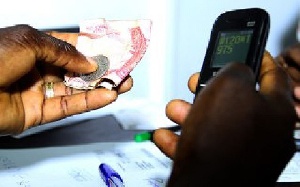 The service allows seamless transfer of monies between mobile money wallets on any network
The service allows seamless transfer of monies between mobile money wallets on any network
Vice-President Dr Mahamudu Bawumia has lauded the various financial stakeholders for implementing the mobile money interoperability platform.
The service allows direct and seamless transfer of funds from one mobile money wallet to another across all networks and creates convenience for users.
Speaking at the launch in Accra on Thursday, 10 May 2018, Dr. Bawumia noted that the service will improve domestic revenue mobilisation and ensure the informal sector makes their contribution to the growth of the economy.
According to him, if the country is able to position mobile money well, it will change the fortunes of the economy.
He said the mobile revolution provides a major opportunity to solve the problem of domestic revenue mobilisation because millions of people have mobile phones.
“Each financial service can, therefore, be delivered through the mobile phone. We could cover at least 70 per cent of the bankable population in Ghana. Today, we have in excess 37 million connected mobile phones in Ghana in a population of less than 30 million and that means a huge number of people may be brought into the financial space just by using the mobile phone,” he stated.
He continued that: “These mobile phones serve as vehicles that can be used to mobilise millions of cedis held outside the banking sector. The mobile phones are actually great tools for financial intermediation to mobilise deposits and also lend particularly to our micro small and medium scale enterprises. If we are able to position mobile money appropriately, we can turn the fortunes of the economy around.”
Dr Bawumia noted that to improve domestic resource mobilisation, there are the usual recommendations for governments to improve the efficiency of tax collections through the reform of financial management system, automation of tax administration and so on.
“However, at the heart of the problem of domestic resource mobilisation is the highly informal nature of many economies underpinned and supported by the predominance of cash transactions as a result of exclusion,” he noted.
According to him, “Many developing countries have not made the link between financial exclusion on one hand and the difficulty of mobilising domestic resources on the other. One of the quickest ways to the formalisation of the economy is therefore to bank the unbanked. If done on a comprehensive scale, financial resources mobbed up in non-financial asserts would be brought into the banking system for intermediation and this will be a significant resource in the financing of investment in the country.
He disclosed that: “In Ghana, after 60 years of independence and more than two decades of financial sector reform, over 60 percent of the population has no bank account and therefore no access to payment instruments other than cash for transactions since most alternative payment instruments are bank based. This means the level of savings in the financial system is low relative to potential, a reason why interest rate on loans continues to be high within many developing countries.”
Also speaking at the event, CEO of Ghana Interbank Payment and Settlement Systems Limited (GhIPSS), Archie Hesse, indicated that negotiations are still underway to expand the mobile money interoperability platform to include other financial operations and link the operability into neighbouring countries.